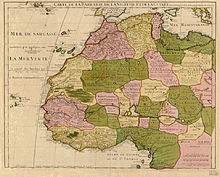From Wikipedia
For other uses, see Barbary Coast (disambiguation).
"Barbary" redirects here. For the novel by Vonda McIntyre, see Barbary (novel).
1707 map by Guillaume Delisle showing northwest Africa, including the Barbary Coast
The name is derived from the Berber people of north Africa. In the West, the name commonly evoked the Barbary pirates and Barbary Slave Traders based on that coast, who attacked ships and coastal settlements in the Mediterranean and North Atlantic and captured and traded slaves or goods from Europe, America and sub-Saharan Africa which finally provoked the Barbary Wars.[2] The slaves and goods were being traded and sold throughout the Ottoman Empire or to the Europeans themselves.
History
Ex-Voto of a naval battle between a Turkish ship from Algiers (front) and a ship of the Order of Malta under Langon, 1719.
Before then, the territory was usually divided between Ifriqiya, Morocco, and a west-central Algerian state centered on Tlemcen or Tiaret. Powerful Berber dynasties such as the Almohads (12th century) and briefly thereafter the Hafsids, occasionally unified it for short periods. From a European perspective its "capital" or chief city was often considered to be Tripoli in modern-day Libya, although Marrakesh in Morocco was the largest and most important Berber city at the time. In addition, Algiers in Algeria and Tangiers in Morocco were also sometimes seen as the "capital".
Purchase of Christian captives in the Barbary States.
See also
- Ottoman Algeria
- Ottoman Tripolitania
- Ottoman Tunisia
- Turkish Abductions
- Pirate Coast, region in the Persian Gulf conquered by Europeans in the early 19th century to quell piracy
- Barbary Coast, San Francisco
- Republic of Salé
External material
References
Links
See also (in our blog)
Traditionalist View on Sex Slavery in Islam
The Orthodox Christian sentiment regarding the persecutions of Christians by Islamist
- London, Joshua E. (2005), Victory in Tripoli: How America's War with the Barbary Pirates Established the U.S. Navy and Shaped a Nation, New Jersey: John Wiley & Sons, Inc., ISBN 0-471-44415-4
- LAFI (Nora), Une ville du Maghreb entre ancien régime et réformes ottomanes. Genèse des institutions municipales à Tripoli de Barbarie (1795–1911), Paris: L'Harmattan, 2002, p. 305
- "When Europeans Were Slaves: Research Suggests White Slavery Was Much More Common Than Previously Believed", Ohio State University
See also (in our blog)
Traditionalist View on Sex Slavery in Islam
The Orthodox Christian sentiment regarding the persecutions of Christians by Islamist



Δεν υπάρχουν σχόλια:
Δημοσίευση σχολίου